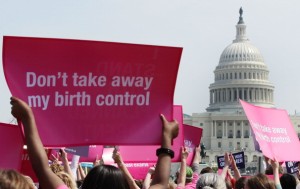
Because of discrimination, violence against women, less access to education, and an intersection of additional human right abuses, women and girls are disproportionately affected when sexual and reproductive rights are denied (Photo credit: Mark Wilson/Getty Images).
By Tarah Demant, Women’s Human Rights Coordination Group
Today, nearly 3,000 people will be infected with HIV. Yet, only 34% of young people in developing countries can answer five basic questions about HIV and how to prevent it.
Around the world, one woman dies every 90 seconds from complications of pregnancy or childbirth—more than 350,000 women every year. The vast majority of these deaths are preventable—child marriage, unsafe and unprotected sex, and inadequate care during pregnancy all contribute to this alarming number.
Complications during pregnancy and childbirth, gender-based violence and AIDS are among the leading causes of mortality for young people. Complications from pregnancy are the leading cause of death among adolescent girls aged 15 to 19 in developing countries.
These alarming statistics are all connected: they are what happen when people’s sexual and reproductive rights not fully respected, protected, or fulfilled.
Being able to make your own decisions about your body and your life is a basic human right. Yet, according to UN estimates, the vast majority of the 1.8 billion young people globally still struggle to access the information, sexuality education, and sexual and reproductive health services they need for a safe and healthy life.
Because of discrimination, violence against women, less access to education, and an intersection of additional human right abuses, women and girls are disproportionately affected when sexual and reproductive rights are denied. Young women, for example, are at a higher risk of HIV infection than young men: there are almost twice as many young women living with HIV globally. Women suffer high levels of injury and death as a result of unsafe abortion.Women die needlessly in childbirth.
Everybody has sexual and reproductive rights. You have the right to:
- Make decisions in regards to your own health, body, sexual life, and identity.
- Ask for and receive information about sex, contraception, and related health services.
- Decide whether and when to have children.
- Choose whether or not to marry and what type of family to create.
- Have access to comprehensive and integrated sexual and reproductive health services, including family planning; contraception; legal abortion in cases of rape, incest, or threat to health or life of the mother; and maternal health care among a range of other health care services. Nobody should be deprived of health care or information on the basis of who they are or what they can afford.
- Live free from rape and other violence, including forced pregnancy, forced abortion, forced sterilization, forced marriage, or female genital cutting.
These human rights, set out in various international human rights laws and treaties, were reaffirmed in 1994 at the UN International Conference on Population and Development (ICPD). Leaders of 179 countries, including the United States, agreed to a Program of Action that would protect and fulfill these rights, yet commitments to these human rights have not been upheld! It’s time these promises were kept!
You can help ensure everyone has access to the their full sexual and reproductive rights.
Leaders are once again meeting (ICPD+20), and we’re calling on them to honor the commitments they made 20 years ago to secure these rights for current and future generations
Tell Secretary of State Kerry to ensure these promises are kept to protect our sexual and reproductive rights and to deliver gender equality! Your body means your rights, and these rights must be protected!
Learn more about Amnesty’s new My Body, My Rights Campaign. Visit our webpage to get materials, take action, and defend your body and your rights!